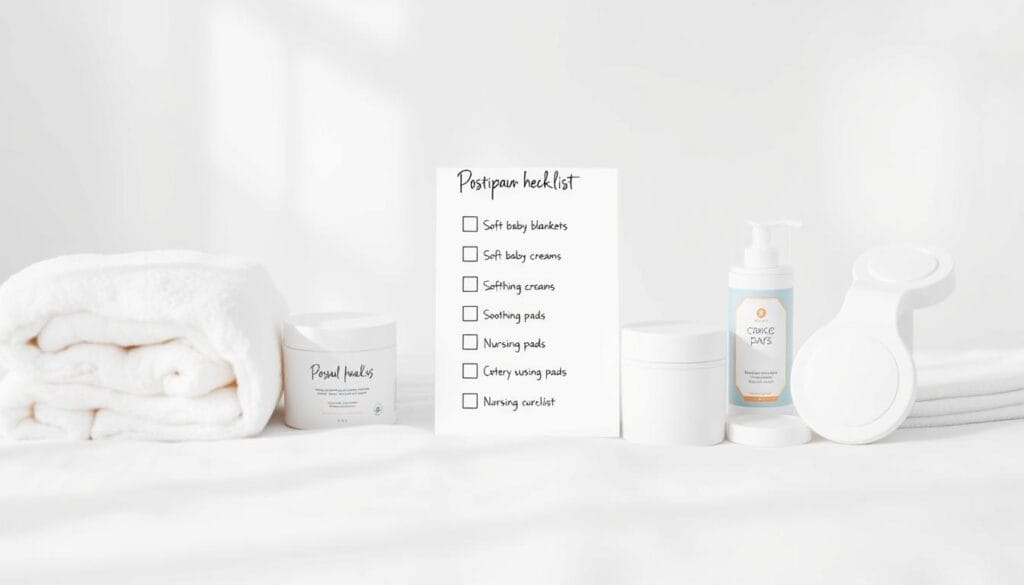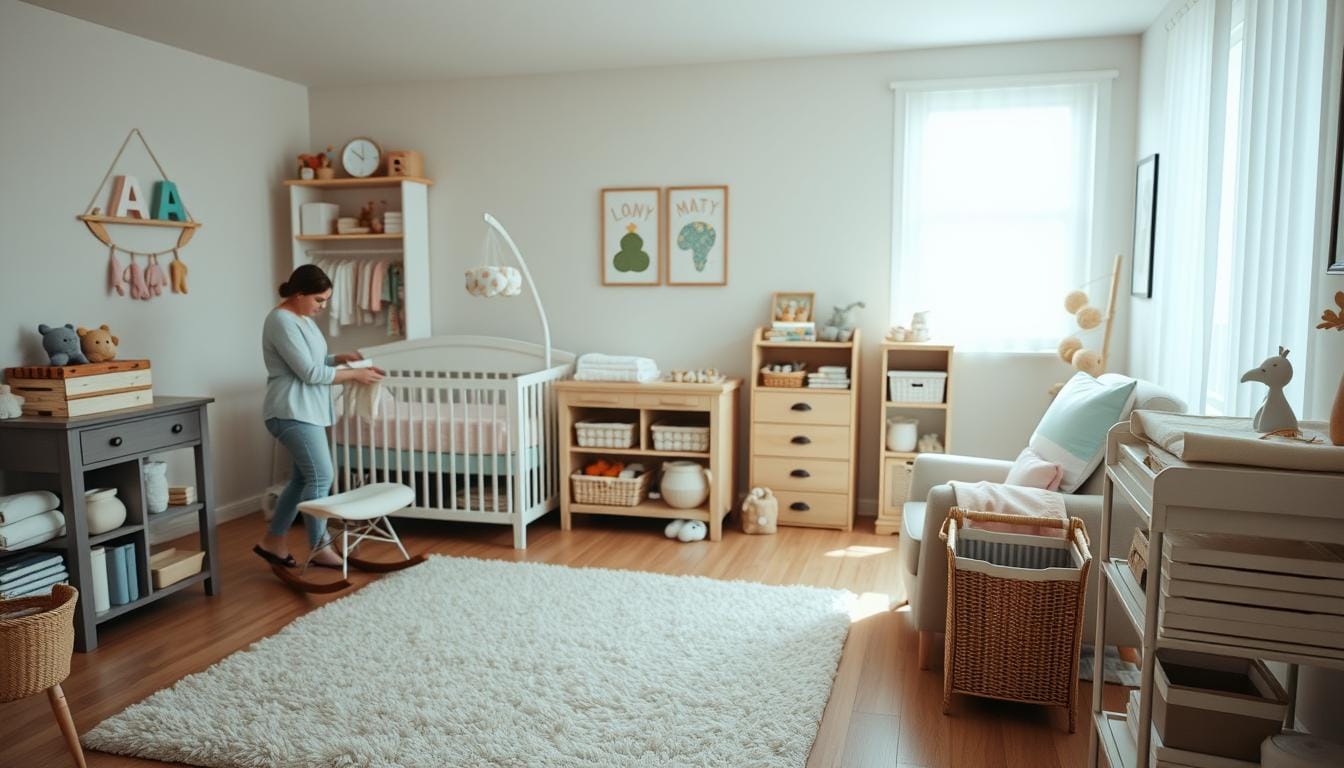Welcoming a new baby is a big change. Preparing your space can make a huge difference in those early days. I remember feeling overwhelmed when I first became a mom. But with some help, I made a cozy and supportive environment for my family.
Getting ready for a new baby is more than just decorating the nursery. It’s about making a comfy recovery space and having the right supplies. It’s also about organizing your home to accommodate your new addition. For more on what you need, check out our article on postpartum essentials.
By using our ultimate checklist, you’ll create a haven for you and your baby. Let’s start!
Understanding Postpartum Needs: Why Preparation Matters
Knowing what you need after having a baby is crucial for a smooth recovery. The postpartum period, also called the fourth trimester, brings big changes. These changes affect both your body and mind.

Getting ready for this time can really help. It’s not just about having the right stuff. It’s about making a space that helps you heal emotionally and physically.
Emotional and Physical Recovery
Healing after childbirth means fixing up from the delivery and getting used to being a new mom. Rest, good food, and taking care of yourself are key. Here are some postpartum recovery tips:
- Give yourself time to rest and heal.
- Drink plenty of water and eat well.
- Start moving again when your doctor says it’s okay.
Support Systems and Resources
A strong support system can really change your postpartum journey. This includes family, friends, and experts like lactation consultants and doulas. Don’t be shy about using postpartum support resources:
- Know who to count on before the baby comes.
- Think about getting a postpartum doula for extra help.
- Look for groups for new moms online or in your area.
Establishing a Safe Environment
Making your home safe and comfy for you and your baby is very important. This means getting your house ready and having what you need. Some important things to think about include:
- Make sure your home is safe for your baby.
- Have all the baby essentials close by.
- Set up a cozy spot for rest and healing.
By focusing on these areas, you can get ready for the postpartum period. This makes it a more positive and empowering time.
Essential Supplies for New Parents
Getting your home ready with the right supplies is key for a smooth postpartum period. As a new parent, you’ll need to make sure you have everything for your baby and yourself. This is important during this big change in your life.

Baby Gear Basics
For baby gear, you’ll need a few must-haves to start. These include:
- Diapers and wipes
- Onesies and other baby clothes
- A crib or bassinet
- A changing pad
- Baby monitors
Having these basics will make the early days of parenting easier.
Personal Care Items for the Mother
Self-care for new moms is crucial during the postpartum period. Some key personal care items are:
- Comfortable clothing, such as nursing bras and loose-fitting tops
- Postpartum recovery pads
- Nipple cream and breast shields
- Cozy socks and slippers
These items will help you focus on your recovery and comfort.
Household Necessities
There are also household essentials to think about. These include:
- Paper plates and cups for easy meal cleanup
- A meal delivery service or prepared meals
- Laundry supplies, such as a diaper pail and laundry detergent
- Cleaning supplies, like a baby-friendly all-purpose cleaner
Having these essentials will help lower stress and make caring for your baby easier.
Creating a Comfortable Recovery Space
Preparing a cozy recovery area in your home can greatly improve your postpartum experience. As you wait for your baby’s arrival, think about creating a nurturing space. This space should support your physical and emotional recovery.

Selecting the Right Location
Choose a quiet and comfortable spot for your recovery area. It should be close to your baby’s nursery for easier nighttime care. This makes feeding and caring for your baby more convenient.
- Ensure the room is at a comfortable temperature.
- Minimize clutter to reduce stress.
- Have all necessary items within arm’s reach.
Setting Up the Nursery
Setting up the nursery is key in preparing your home for your baby. It should be safe, comfortable, and have all the essentials.
- Choose a crib that meets current safety standards.
- Prepare a diaper changing station with all necessary supplies.
- Install blackout curtains or shades to help your baby sleep.
Cozy Spaces for Rest and Relaxation
Creating cozy spaces for rest and relaxation can also help your recovery. Think about setting up a comfortable reading nook or a quiet area for breastfeeding.
Tips for a Cozy Space:
- Use soft lighting to create a calming atmosphere.
- Incorporate comfortable seating and pillows.
- Keep a water bottle and healthy snacks nearby.
By focusing on these aspects of postpartum home prep, you can create a supportive and comforting environment. This environment will aid in your recovery and bonding with your baby.
Meal Preparation: Easy and Nutritious Options
Preparing meals ahead of time is a big help for new parents. It offers healthy choices when you need them most. During the postpartum period, eating nutritious food is key. It helps with recovery and keeps you energized.
Make-Ahead Meals for the Freezer
Freezing meals is a smart way to save time. Try making lasagna, casseroles, or soups. They’re easy to make and freeze well. For more ideas, check out this postpartum meal prep guide with lots of recipes and tips.
- Lasagna
- Casseroles
- Soups
- Individual portions of meals like chicken or vegetable dishes
Healthy Snacks for New Parents
Having healthy snacks ready is key for new parents. Choose snacks like nuts, dried fruits, or energy bars. Also, prepare snack packs in advance to save time. These snacks can help with new mom self-care.
- Nuts and seeds
- Dried fruits and fruit leathers
- Energy bars
- Fresh fruits
Staying Hydrated: Beverages to Keep Handy
Drinking enough water is crucial, even more so for new moms, if they’re breastfeeding. Always have a water bottle with you. Also, keep herbal teas or coconut water on hand. They’re refreshing and good for your health.

By focusing on meal prep and staying hydrated, new parents can take better care of themselves. It’s about making small changes that make a big difference in health and well-being.
Organizing Your Home for Baby’s Arrival
As you count down the days until your baby’s arrival, it’s essential to get your home in order. Organizing your space can help reduce stress and create a safe environment for your little one to grow and thrive.
Decluttering Before Baby
Before your baby arrives, take some time to declutter your home. Start by going through each room and removing any unnecessary items. Consider donating or selling items that are still in good condition. This will not only free up space but also make it easier to clean and maintain your home. For more tips on decluttering, check out this article on 9 things to do to get your house in order before baby.
Baby-Proofing Key Areas
Baby-proofing is a critical step in preparing your home for your new arrival. Focus on key areas such as the kitchen and bathroom, where potential hazards are more common. Secure any heavy furniture or appliances, install safety gates at the top and bottom of stairs, and lock away any cleaning supplies or chemicals. You can find more detailed guidance on baby-proofing in other sections of this guide.
Designating Zones for Baby Care
Designating specific zones for baby care can make a big difference in your daily routine. Create a comfortable feeding area with a nursing pillow and a side table for your essentials. Set up a changing station with all the necessary supplies within arm’s reach. Consider creating a soothing sleep environment with a white noise machine or a mobile above the crib.

By decluttering, baby-proofing, and designating zones for baby care, you’ll be well-prepared for your baby’s arrival. Remember, the key is to create a safe, comfortable, and welcoming environment that allows you to focus on what really matters – enjoying time with your new baby!
Support Networks: Who Can Help?
Starting a new life with a baby can feel overwhelming. But, with the right support, it gets easier. Having a strong support system is crucial for your emotional and physical health during this time.

Engaging Family and Friends
Family and friends are often the first to offer help. They can assist with household tasks, baby care, or just listen. It’s important to tell them what you need to get the help you deserve. Make a list of tasks you’d like help with, like grocery shopping or cooking.
- Start a meal train with friends and family for healthy meals.
- Ask for help with light housekeeping from a family member or friend.
- Have someone watch the baby so you can rest.
Finding Local Support Groups
Local support groups offer a sense of community and connection. Look for groups focused on new parents in your area. You can find them at community centers, churches, or online. These groups meet regularly, providing a space to share, ask questions, and get emotional support.
Joining local support groups has many benefits:
- You’ll meet other new parents in your area.
- You can share experiences and advice.
- You’ll get access to local resources and recommendations.
Online Resources and Communities
Online support is also valuable. Online forums and social media groups for new parents offer 24/7 support. Look for reputable sites and groups that meet your needs.
Some top online resources include:
- Online forums for parents.
- Social media groups for new parents.
- Blogs and websites with parenting advice and support.
By using these support networks, you can make your postpartum journey better. You’ll get the care and support you need during this big change.
Time Management: Balancing Baby Care and Self-Care
Managing time between baby care and self-care is tricky. But, with smart strategies, it gets easier. In the postpartum period, managing time well is key. It helps you care for your baby and yourself.
Scheduling Your Day: A New Routine
Creating a new daily routine is a good start. First, list your top priorities like feeding times and rest. Make a schedule that’s flexible for the surprises of caring for a newborn.
- Set realistic goals for what you can do in a day.
- Use a planner or app to stay organized.
- Leave some buffer time for unexpected tasks or just relaxing.
Prioritizing Rest and Recovery
Rest and recovery are crucial after having a baby. Prioritize sleep when your baby sleeps to recharge. Also, ask your partner or support system to watch the baby while you rest.
Some postpartum recovery tips include napping, gentle stretches, and staying hydrated. Remember, caring for yourself is not selfish. It’s necessary for being a good parent.
Incorporating Short Breaks
Short breaks throughout the day can help with stress and mental health. Whether it’s a short walk, a cup of tea, or deep breathing, these moments refresh you.

As you face new motherhood’s challenges, remember that new mom self-care is essential. By focusing on your well-being, you’ll be better at caring for your baby and enjoying this time.
The Importance of Postpartum Health Check-Ups
Postpartum health check-ups are key to your recovery after having a baby. They help monitor your health, both physical and emotional. This ensures you’re healing right and tackles any issues that might come up.

What to Expect During Your Check-Up
Your healthcare provider will do a physical exam during your check-up. They look for signs of complications like infection or too much bleeding. They also check on your emotional health, looking for signs of depression or anxiety.
This is a chance to ask about your recovery, breastfeeding, and caring for your baby.
Key aspects of the check-up include:
- Physical examination to assess healing
- Discussion of emotional well-being
- Addressing concerns about breastfeeding and baby care
- Review of any medications or supplements you’re taking
Recognizing Warning Signs
Knowing the warning signs is crucial during the postpartum period. Look out for severe pain, heavy bleeding, fever, or signs of infection. Also, watch for extreme mood swings, feeling overwhelmed, or anxiety.
Some critical warning signs to watch for:
- Severe abdominal pain or cramping
- Heavy or prolonged bleeding
- Fever over 100.4°F
- Signs of infection, such as redness or swelling
- Extreme mood swings or feelings of sadness
Seeking Professional Support
If you notice any concerning symptoms or have questions, seek professional help. Your healthcare provider is there to guide you through the postpartum period. They ensure your health and well-being.
By focusing on your postpartum health and listening to your body, you can have a smoother recovery. This helps you and your baby start off healthy.
Managing Visitors Post-Baby
Welcoming visitors after having a baby is a joy. But, it’s key to set some boundaries for a smooth recovery. As a new mom, you’ll want to cherish these early moments with your baby. Too many visitors can be overwhelming.

Setting Boundaries
Setting boundaries is crucial when it comes to managing visitors. It’s okay to say no to visitors or limit the number you receive at any given time. You can also set specific visiting hours to manage your day and ensure you get enough rest.
Consider creating a “visitors’ rule” list. For example, no visiting during your baby’s nap time or limiting the number of visitors per day. This will help you maintain your energy levels and focus on your recovery and bonding with your baby.
Communicating Your Needs
Communicating your needs to your family and friends is vital. Let them know how they can support you during this time. You might need help with household chores, meal preparation, or just some company that doesn’t involve too much interaction.
Be clear about what you need and what you’re comfortable with. You can say, “I’m so grateful for your support! Right now, I need some help with cooking meals. Could you bring over some healthy options?” or “I’d love some company, but I’m taking it easy, so maybe we could just have a quiet chat?”
Creating a Visitor Schedule
Creating a visitor schedule can help you manage the flow of visitors and ensure you’re not overwhelmed. You can use a shared calendar or a simple notebook to keep track of who’s coming and when.
- Schedule visits around your baby’s routine to minimize disruptions.
- Limit the duration of visits to avoid exhaustion.
- Consider having a “no visitors” day or two to rest and recharge.
By setting boundaries, communicating your needs, and creating a visitor schedule, you can enjoy the company of your loved ones. This is important for your postpartum home prep and new mom self-care.
Educating Yourself: Research and Resources
Learning as much as you can is key to a smooth start as a parent. With the right information, you’ll be better equipped for your baby’s arrival. Having the right resources can make a big difference.

Recommended Books and Podcasts
There are many books and podcasts that offer great advice on parenting. “What to Expect When You’re Expecting” and “The Happiest Baby on the Block” are top picks. They give you a detailed look at the ups and downs of being a parent.
- Parenting Guides: Books that cover pregnancy, childbirth, and the early days of parenting.
- Parenting Podcasts: Shows that discuss various aspects of parenting, from baby care to personal well-being.
Online Courses for New Parents
Online courses are a fantastic way to learn and grow as a new parent. Sites like Coursera, Udemy, and edX have courses on parenting and child development. They’re perfect for those who like to learn at their own pace.
- Child Development Courses: Understanding how your baby develops can help you provide better care.
- Parenting Skills Courses: Learn effective parenting techniques and strategies.
Attending Workshops
Workshops and classes are great for meeting other parents and learning from experts. Hospitals and community centers often host these, covering topics like breastfeeding and baby care.
- Breastfeeding Workshops: Learn about the benefits and techniques of breastfeeding.
- Baby Care Classes: Understand the basics of caring for your newborn.
By using these resources, you’ll feel more ready and confident for your baby’s arrival. Remember, learning is a continuous journey, and there’s always help available.
Understanding Infant Care Basics
Infant care is a journey filled with knowledge and patience. Preparing for your baby’s arrival is exciting. Learning the basics of infant care boosts your confidence and helps you give your baby a great start.
Feeding: Breastfeeding and Formula Options
Feeding your baby is key in infant care. You must choose between breastfeeding, formula, or a mix of both. Breastfeeding is great for nutrition and bonding. But, it’s not for every mom.
Formula feeding is a good option too. There are many formulas to meet different needs. Always talk to your healthcare provider about the best feeding plan for you.

- Breast milk gives essential antibodies and nutrients.
- Formula options include cow’s milk-based, soy-based, and hypoallergenic formulas.
- It’s essential to consult with your healthcare provider to determine the best feeding plan.
Diapering Essentials
Diapering is vital in infant care. You must choose between disposable and cloth diapers. Think about convenience, cost, and the environment. A well-stocked diaper changing station is crucial.
- Keep diapers, wipes, and a diaper cream within easy reach.
- Ensure the changing surface is clean and safe.
- Never leave your baby unattended on a changing surface.
Soothe Your Baby: Comforting Techniques
Comforting your baby is an art. It’s about understanding their cues and responding well. Swaddling, rocking, and white noise are great techniques.
- Swaddling can help your baby feel secure and comforted.
- Rocking gently can soothe a fussy baby.
- White noise machines can mimic the womb environment, helping your baby relax.
Mastering these basics helps you create a nurturing space for your baby. This ensures a strong start for their growth. Remember, it’s okay to ask for help. Every baby is unique, with their own needs and preferences.
Mental Health and Postpartum Well-Being
Being a new mom can feel overwhelming. It’s key to focus on mental health as much as physical health. The journey to motherhood is not just about healing from childbirth. It’s also about dealing with emotional changes.

Recognizing Anxiety and Depression
New moms often feel anxious or depressed after giving birth. Spotting these signs is the first step to getting help. Symptoms include feeling sad, anxious, or hopeless all the time.
- Common Signs: Mood swings, feeling overwhelmed, or persistent sadness.
- What to Do: Reach out to healthcare providers or support groups for guidance.
Seeking Help: Therapists and Counseling
Getting professional help shows strength, not weakness. Therapists and counselors can help manage anxiety and depression. They offer a safe place to talk about feelings and worries.
Counseling Options: Look into individual therapy, support groups, or online counseling for new moms.
Self-Care Practices for New Moms
Self-care is essential during the postpartum period. Simple actions can greatly improve mental health.
- Rest: Try to sleep when you can, even if it’s just for a few minutes.
- Nutrition: Eat balanced meals and healthy snacks to keep your energy up.
- Support Network: Be around people who can offer emotional support.
By focusing on mental health and getting support, new moms can handle the postpartum period better. They can feel more confident and at ease.
Planning for Sibling Adjustment
When a new baby arrives, it’s important to plan for a smooth transition for siblings. This ensures a positive experience for everyone. As a parent, understanding and meeting the needs of your existing children is key.
Introducing the New Baby
Introducing the new baby to siblings should make them feel included and loved. Here are some tips to help:
- Prepare them in advance: Talk to your children about the new baby before they arrive. Explain what to expect and how they can help.
- Make it a special moment: Consider giving your older children a small gift from the new baby. This makes them feel special and part of the experience.
- Supervise the first meeting: Make sure the first interaction between siblings is supervised. This prevents harm to the new baby and reassures your older children.
Encouraging Positive Interaction
Encouraging positive interaction between siblings is crucial for a harmonious home. Here are some strategies to promote a loving relationship:
- Model good behavior: Show your children how to be gentle and kind to the new baby by modeling this behavior yourself.
- Encourage helping hands: Let your older children help with simple tasks related to the baby’s care, like bringing diapers or toys.
- Spend quality time together: Make sure to spend quality time with each child doing activities they enjoy. This maintains their sense of importance and love.
Addressing Sibling Concerns
Siblings may feel jealous or left out with the arrival of a new baby. It’s important to address these concerns promptly:
- Listen to their feelings: Create an open environment where your children feel comfortable expressing their feelings about the new baby.
- Reassure their importance: Let your children know they are loved and important. The new baby’s arrival doesn’t diminish their role in the family.
- Maintain routines: Stick to familiar routines and traditions as much as possible. This provides a sense of stability and normalcy.
By following these tips and being mindful of your children’s needs, you can create a positive and loving environment. Effective postpartum home prep and post-baby home organization are key to a smooth transition for everyone.
Preparing for Postpartum Challenges
Getting your home ready for your baby is important. But, preparing yourself for the postpartum period is just as crucial. This time needs focus on your physical and emotional health. Having the right strategies can make a big difference.
Common Physical Issues
After giving birth, you might face pain, swelling, and discomfort. Knowing about these issues and having tips can help you get through it. Talk to your healthcare provider about any concerns or symptoms you have. They can offer personalized care after birth.
Managing Fatigue and Exhaustion
Fatigue is a big issue during the postpartum period. Rest when your baby sleeps and ask for help when needed. Simple things like a warm bath or gentle stretches can help fight fatigue.
Strategies for Overcoming Challenges
It’s key to have strategies for the postpartum period. Build a support network, take care of yourself, and listen to tips from healthcare and other moms. Being prepared and having support helps you care for your baby better.
